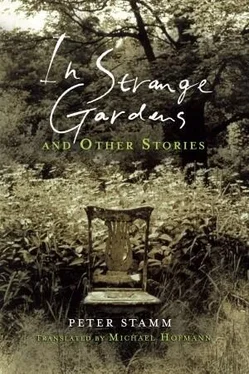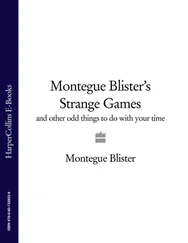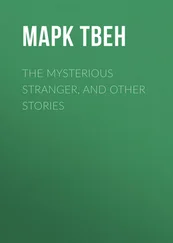The others had nice trailers, Joe’s you could extend every which way, it was like a proper apartment with a lounge unit and a video and all the works. Henry wanted a trailer like that for himself. And he wanted a woman, too, and a kid. He wasn’t far short of forty now and the boss wouldn’t object, so long as it was the right girl. One like Oskar’s Jackie, or Charlie’s Verena, or Joe’s Petra, who cooked for Henry as well, and sometimes washed his clothes. The others had it all, and he had nothing. But then a woman set you back more than a new pair of pants.
Henry couldn’t complain. He had his peace and quiet, and he got to see places. In fact, he could hardly do much better for himself. What did he lack? He was doing fine, better than in the old GDR. Back then, he’d been a milkman. After the Wall came down, he was out of a job. He’d let them make a monkey of him. He had hung around on corners, got into scrapes, and went through his little bit of unemployment benefit in gambling saloons. Then one evening Joe and his boys had come into town, and after the performance Henry had gone over to the artistes and helped them take down the stand. They could sure use someone like him, Joe had said, and Henry grinned. It wasn’t something he often got to hear. Then he joined the troupe, just went along with them when they left town the next day. And ever since then, he’d been traveling with them, from village to village and town to town. He put up his antenna, kept an eye on the cars, and every night crashed head first through the wall of fire.
The fire devil, that had been Petra’s idea. Henry the Fire Devil. He’d been with the troupe now for six or seven years, living behind the cab. This year you’re getting a trailer, Joe had promised, but then he said he didn’t want them to get to look like a bunch of Gypsies, and someone after all had to mind the vehicles at night. Some day, Joe said, you’ll find yourself a woman. And then we’ll think again. And Oskar promised he would teach Henry how to drive on two wheels.
Henry heard a noise, a quiet thump. He got up and walked over to the cars. The asphalt was still glistening with rain, and as Henry ran through the piled up containers, he felt like an Indian in the Grand Canyon. There was another thump. Henry ran to the cars, just in time to see a stone fly through the air and smash against the rear window of one of the cars. He ran in the direction from which the stone had come. And then he saw the kids running off. He swore, picked a rock off the ground, and flung it at them. But they had already run around the back of the containers.
Henry stood on the tracks, which seemed to go on endlessly in either direction. He looked left and right, and then he set off. On the other side of the embankment, he stopped. He waited for a long time till a goods train came. He counted the cars, just as he had done when he was a kid. In America, there were people who hopped on the goods trains, and traveled the length and breadth of the country. Henry wondered where this train was going. He counted forty-two cars. Gravel.
The sun had dipped behind the nearby line of hills, but it was still light. Henry walked along the embankment till he came to a path, which led to the main street. From afar he could make out the yellow M, and when he was closer, the life-sized plastic clown who was sitting on a bench outside the snack bar, smiling.
Seated at a corner table were three forestry workers. Behind the bar was a young woman. Manuela, he read on her name tag. Henry ordered a burger and a Coke. They didn’t serve beer, Manuela had said. One moment.
“Are you from the East?” she asked him as he paid.
From the East, said Henry, and that he was an artiste. Over there, he said, pointing towards the container depot, there would be a show tomorrow. Car stunts. If she liked, he could get her in for free. Cars, said Manuela, cars didn’t really interest her. A stunt show, said Henry, cars driving on two wheels, motorbike leaps over forty people.
“Forty people?” asked Manuela.
“Not actually forty people lying there,” said Henry. “Earlier, we used to.”
On Monday they’d be gone already, he said. They were headed south, for Greece or Italy or someplace.
“Greece is beautiful,” he said. “You can go swimming there every day.”
He said his name was Henry. Manuela, she said. I know, said Henry, and he pointed to her name tag. Manuela laughed. Was he really a stuntman? Yes, kind of thing, he said. Did she have a boyfriend? Because she could bring him along as well. No, said Manuela. Her accent was sweet. She was sweet altogether.
“Me neither,” said Henry. “On the road the whole time.”
There was silence for a moment. Then Manuela said, wait. She disappeared and came back and gave Henry a baked apple pie.
“Here you go,” she said. “But careful. It’s hot.”
Henry thanked her.
“If my boss saw me do that,” said Manuela, “I’d be out of a job.”
“Then you can come along with us,” said Henry.
Manuela had to work till midnight. But tomorrow morning she was free, sure. She didn’t go to church or anything. There was nothing to do here on Sundays. Small animal show jointly sponsored by the fur sewing association and the ornithological society.
“Do you like that sort of thing? Birds and bunnies?”
“Sure,” said Henry. “It’s worth a look.”
They arranged to meet at the bus stop at nine o’clock tomorrow morning. But he had to be back by noon, said Henry, to get ready for the matinee.
The pet show didn’t have much to offer either of them. After fifteen minutes they were done. They sat in the refreshment tent and drank coffee.
“My father used to have a dog,” said Henry. “A German shepherd.”
“I used to have a hamster,” said Manuela.
“What did you like the best?”
“The rabbits. The baby ones.”
“See them in their cages,” said Henry. “They were shit scared.”
He’d liked the birds best, they were so colorful, the budgies and the finches and all the others. One of the breeders had told him the names and the countries they came from, a big man with a face like a bird and a high squeaky voice. That was from some disease he had, said Manuela. “Do you want some cake?” she asked.
“What? A baked apple pie?” Henry grinned.
“If my boss had caught me,” said Manuela.
Then they were quiet for a time. There was a folk music tape playing in the refreshment tent.
“Do you know any jokes?” asked Henry. “D’you like the music?”
“I like Elvis,” said Manuela. “Used to. Still do, really.”
They drank their coffee and went. They headed out of the village in the direction of the container park. They passed through a development with high-rise blocks. This was where Manuela had grown up. A couple of years ago, her parents had moved away. Now she lived in the village with a girlfriend. The path went along beside the railway tracks. Henry plucked a flower that was growing on the embankment, and offered it to Manuela. She said thank you, and giggled.
“Where I live isn’t much more than a rabbit stall,” said Henry.
He hadn’t thought Manuela would go with him. The poster of the Erotica Fair embarrassed him. But it didn’t seem to put her out at all. Bachelor pad, she said, and sat down on the unmade bed.
“Do you often have girls up here?”
“I wish,” said Henry. “I’m always on the road. Shitty life.”
He kissed her, not very skillfully. And when he tried to take her clothes off, Manuela had to help him. Her jeans were so tight that she had to lie down, while he tugged at the cuffs. Her bra didn’t have a fastening, she just pulled it over her head like a T-shirt. Never seen one of those before, said Henry. The rest Manuela did by herself. Then Henry got undressed, quickly, and with his back to her. He sat down on the bed without turning around, and quickly slid under the thin blanket.
Читать дальше












